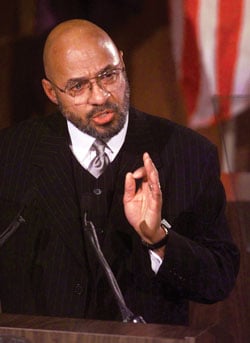ABA opposes limiting how much student loan debt may be discharged under federal program

Former ABA President Dennis Archer has been appointed chair of current ABA President James Silkenat’s newly formed Task Force on the Financing of Legal Education. AP Photo/Mike Groll
A provision in President Barack Obama’s proposed budget for fiscal year 2015 calls for reducing the amount of federal student loans that could be discharged under the Public Service Loan Forgiveness Program. But the ABA is marshaling its advocacy resources to oppose legislation that would implement the administration’s proposal.
In resisting Obama’s proposal, the ABA is seeking to preserve a program that it played a key role in helping to create in 2007. The Public Service Loan Forgiveness Program discharges a portion of federal student loan debt for individuals who commit to at least 10 years of public service work, including employment by government and nonprofit charitable organizations.
The program, in conjunction with two other federal initiatives—Income-Based Repayment and Pay as You Earn—allows eligible borrowers to repay loans at an affordable percentage of their income, and discharges any remaining balance upon completion of 120 monthly payments. The first group of enrolled public service workers will be eligible for loan forgiveness in 2017.
INSUFFICIENT RELIEF
The Obama administration, however, has proposed a loan forgiveness cap of $57,500, which would leave law students, who often graduate with more than $100,000 in school loan debt, with a substantial portion of their original loans to repay.
In 2012, the average amount borrowed by graduates of private law schools exceeded $122,000, and many law school grads have a combined undergraduate and law school debt of $150,000 or more. The National Association for Law Placement reported that the median entry-level salary was about $43,000 for legal services lawyers, $45,000 for those with public interest groups, and $50,000 for public defenders and local prosecutors.
“Lawmakers should be concerned because if the limit is ever enacted it would deprive government and public service employers—including state and local prosecutors, public defenders and civil legal aid offices—of a critically needed tool to fulfilling their public missions,” says Thomas M. Susman, director of the ABA’s Governmental Affairs Office. “This would, in turn, deprive vulnerable clients of the services these highly trained professionals can provide. Lawyers choosing a public service career path should be supported, not compromised.”
So far, there has been no action on the president’s proposal, but members of Congress are taking the issue of student debt seriously. Numerous bills have been introduced during the 113th Congress, including measures to establish a “bill of rights” for people with student loans (S. 1803 and H.R. 3892), and proposals to lower interest rates for federal student loans and allow borrowers to refinance their current student loans at the lower rate (S. 2292 and H.R. 4582).
“Exploding student loan debt is crushing young people and dragging down our economy,” says Sen. Elizabeth Warren, D-Mass., a sponsor of S. 2292. “Allowing students to refinance their loans would put money back in the pockets of people who invested in their education.”
The ABA has a long-standing policy of supporting programs—including loan repayment assistance, loan forgiveness and public service scholarships—to enable law school graduates to accept and remain in lower-paying government and public service jobs.
On May 6, ABA President James R. Silkenat, a partner at Sullivan & Worcester in New York City, announced the creation of a new Task Force on the Financing of Legal Education to look at the cost of legal education for students, the financing of law schools, student loans and educational debt. The task force, chaired by 2003-04 ABA President Dennis W. Archer, also will review current law school practices regarding the use of merit scholarships, tuition discounts and needs-based aid. Archer is a former mayor of Detroit, former justice of the Michigan Supreme Court and chairman emeritus of the Dickinson Wright law firm in Detroit. Former ABA President Dennis Archer has been appointed chair of current ABA President James Silkenat’s newly formed Task Force on the Financing of Legal Education.
This article originally appeared in the July 2014 issue of the ABA Journal with this headline: “Keep the Caps Off, Please: ABA opposes limiting how much student loan debt may be discharged under federal program.”
This report is written by the ABA Governmental Affairs Office and discusses advocacy efforts by the ABA relating to issues being addressed by Congress and the executive branch of the federal government. Rhonda McMillion is editor of ABA Washington Letter, a Governmental Affairs Office publication.



